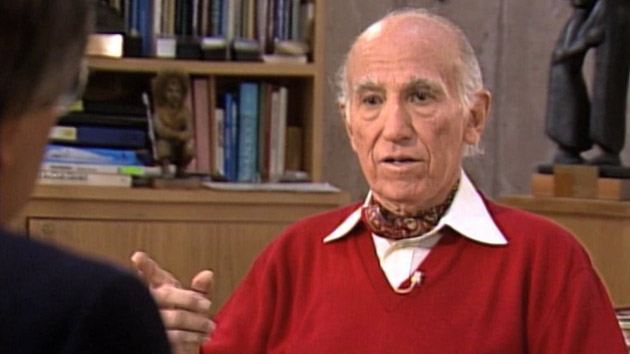
This story was originally published on BillMoyers.com.
Had he lived, Dr. Jonas Salk would have turned 100 this week. Salk was a young man when in the spring of 1955 he announced his discovery of a vaccine that could prevent polio. He was hailed as a modern miracle worker. He went on to lead scientists from from around the world in studies of cancer, heredity, the brain, the immune system and AIDS at the Salk Institute for Biological Studies in La Jolla, California.
In this age of Ebola, it’s enlightening and inspiring to hear Salk talk about the lessons he learned in developing the polio vaccine, and how they might be applicable to the AIDS crisis, which was raging at the time of this interview with Bill Moyers recorded in 1990.
Salk died five years after this interview was broadcast. His memorial at the Salk Institute reads: “Hope lies in dreams, in imagination and in the courage of those who dare to make dreams into reality.”
TRANSCRIPT
SALK: What we’re doing now is trying to think like nature, in the sense that we are aware that species that have gone before us have disappeared from the face of the Earth. We’d like to use our intelligence and our creative capacity to prolong our presence on the face of the Earth as long as possible. It requires, therefore, that we develop the kinds of tactics and strategies amongst ourselves so as to assure that this can occur, to assure that we will not destroy ourselves or the planet, to make it uninhabitable and to allow the fullness of the potential of the individual to be expressed, to flower. That is—
MOYERS: What is—
SALK: —awfully ideal. The question now is how can we translate this, how can we make this operative? If you want me to give you an example—
MOYERS: Yeah.
SALK: —of how people can solve problems for themselves? When the problem of polio confronted this nation, confronted the world, there was an organization that formed in this country called the March of Dimes. Volunteers. They were not government-directed or -led. They didn’t ask the government to do anything. They did it themselves. That’s just a small illustration of what has happened in the past and can happen again and is happening continuously now here and, I think, in other parts of the world.
MOYERS: I read the other day, coming out here, in fact, that by the year 2000, which is not very far from now, there will be some 20 million people in the world carrying the AIDS virus. Is that a comparable challenge to what you faced with polio 50 years ago?
SALK: Well, it’s an even more difficult challenge, but that’s what evokes a response on the part of those who want to solve the problem, who are addressing themselves to just that question and philosophically, in approaching it. The virus, if it prevails, then we will lose. But if we are able to reduce the damage caused by the virus and, at the same time, try to enhance the immune response to the virus and establish a more favorable balance between the two, then we will be doing in relation to that problem what we want to do in relation to the world and that is to reduce the negative and enhance the positive at one and the same time.
MOYERS: The good news would be that there is a vaccine that protects us and immunizes us, against the AIDS virus. Are we going to have that good news, do you think, in your time and mine?
SALK: My expectation is that we will solve the problem. It’s just a matter of time and just a matter of strategy. Now, why do I say that this is the case? It’s because I think solutions come through evolution. It comes through asking the right question, because the answer pre-exists. But it’s the question that we have to define and discover, to discover and to define.
MOYERS: You mean, when you asked the question about how to defeat polio, the answer was already there?
SALK: Mm-hmm, in a way. If you think of David and Michelangelo, it was in the stone, but it had to be unveiled and revealed. You don’t invent the answer. You reveal the answer.
MOYERS: From nature.
SALK: From nature.
MOYERS: From the life process.
SALK: Yes.













